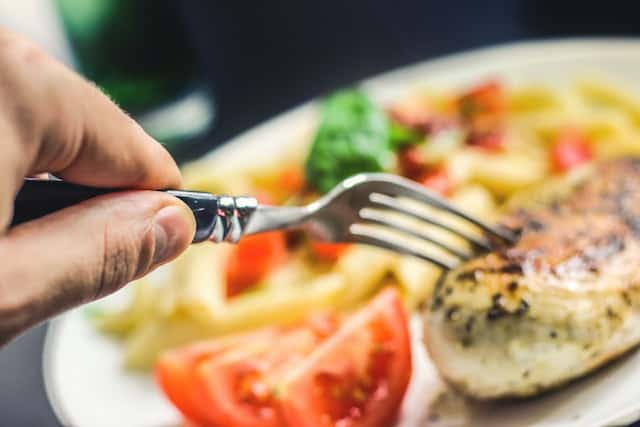5 Easy Ways to Control Overeating Desire
5 Easy Ways to Control Overeating Desire
Overeating can be a tough habit to break, but there are some easy ways to control your desire to overeat. Here are five ways to control overeating desire to help you get started:
Many people feel they have an excessive appetite. If this desire is fulfilled, it can be bad for health. Overeating can be a tough habit to break, but there are some easy ways to control your desire to overeat. Here are five tips to help you get started
The body is constantly in need of fuel to function properly. One source of energy needed by the body comes from food. At certain moments, the body begins to crave sweets and other oily foods.
Actually if done once in a while it’s not a problem. Especially if someone who follows a healthy and balanced diet regularly.
It’s different if the desire to eat is obeyed by those who have irregular eating patterns. If left unchecked, the habit will actually bring serious illness and endanger health.
5 Easy Ways to Control Overeating Desire

Consumption of the Right Food
In order for the diet to work, pay attention to the right time to eat. Make sure to always eat on time with the right portion to avoid overeating.
The desire to overeat can be caused by the body’s lack of key nutrients and starvation. To avoid this condition, it is important to consume the right foods at the right time to eat too.
You can also increase your intake of snacks, but make sure to consume something healthy. Include fruits, nuts, vegetables, and whole grains.
You can also follow a healthy diet that was revealed by this nutritionist.
Avoid Crash Diets
Don’t immediately go on a strict diet because this is actually unhealthy.
Many people think a strict diet needs to be done to avoid excessive appetite. This diet may indeed be able to lose weight quickly, but the eating habits are actually unhealthy.
This is because, some people will choose to avoid all kinds of foods that they think can gain weight.
For example, they will avoid all forms of carbohydrates. In fact, carbohydrates are an important food intake because they provide a source of energy needed by the body for activities.

Stop Obsessing With Calories
Calories obtained from food and drink are also needed by the body to support the performance and function of various organs in the body. However, its consumption should not be excessive.
A person has different calorie needs every day. It is better if the intake of food and drink does not exceed these needs so that it does not have an impact on other health.
However, some people often think too much about the calories they get and in the end it makes them stressed and anxious.
This anxiety can certainly result in increased appetite. Therefore, try to calm down and not be too hasty in going on a diet.
Do not starve the body
The condition of the body that is too hungry can actually increase cravings. It’s better to stick with healthy snacks like fruits and vegetables.
Some people prefer to eat when their stomach just feels hungry. Even though eating when hungry is not a good thing.
It is important to avoid excessive hunger by eating regularly or filling the stomach with healthy snacks such as fruit.
With this arrangement, one could avoid feeling hungry for a long time.
Fight stress
Stress conditions not only interfere with mental health, but can also interfere with physical health. Stress can cause a person to crave more food.
Not only about cravings, but stress can also affect eating behavior, especially for women. Stressed women have been shown to eat significantly more calories and have more cravings than those who are not stressed.
Stress can also increase cortisol levels in the blood, a hormone that makes you gain weight, especially in the stomach area. Manage stress by doing healthy things, like exercising or meditating.
Here are few more ways you can try to control your appetite
- Eat slowly and mindfully. When you eat slowly and mindfully, you give your body a chance to register when you’re full. Take small bites, chew your food thoroughly, and savor each bite. Pay attention to how your body feels and stop eating when you’re comfortably full.
- Drink plenty of water. Drinking water can help you feel full and reduce your desire to eat. Aim to drink at least 8 glasses of water per day, and drink a glass of water before each meal to help you feel more full.
- Plan your meals and snacks. When you plan your meals and snacks ahead of time, you’re less likely to reach for unhealthy snacks or overeat at mealtime. Plan your meals and snacks around nutrient-dense foods like fruits, vegetables, lean protein, and whole grains.
- Avoid distractions while eating. When you eat while watching TV, browsing social media, or working on the computer, you’re more likely to overeat. Try to eat your meals and snacks in a distraction-free environment, and focus on your food and how it makes you feel.
- Practice self-care. Overeating can often be a result of stress, anxiety, or boredom. Find healthy ways to manage these feelings, such as practicing yoga, meditating, taking a walk, or calling a friend. When you take care of your mental health, you’re less likely to turn to food as a coping mechanism.
Contributed by Ms. Cecilia D





